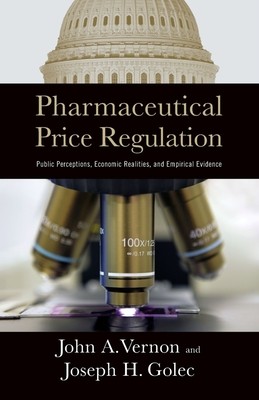
- We will send in 10–14 business days.
- Author: John A Vernon
- Publisher: Rowman & Littlefield Publishers
- ISBN-10: 0844742775
- ISBN-13: 9780844742779
- Format: 13.7 x 20.8 x 1 cm, softcover
- Language: English
- SAVE -10% with code: EXTRA
Reviews
Description
Breakthrough drugs have saved millions of lives and improved the health of countless people around the world. Unfortunately, they are also expensive, leading many political leaders to call for price controls, importation, or other procedures to reduce their cost. In Pharmaceutical Price Regulation: Public Perceptions, Economic Realities, and Empirical Evidence, John A. Vernon and Joseph H. Golec argue that price controls and other cost-limiting measures will starve pharmaceutical companies of the R&D money required to develop new drugs. A drug can cost $1 billion or more before it ever appears in the marketplace-and only three out of every ten new drugs ever recoup their development costs. This groundbreaking monograph demonstrates empirically how the free-market system of drug pricing is vital to the development of new breakthrough drugs. Drug companies take a long-term view towards R&D investment, balancing projected profits against the costs of clinical development. This puts them in conflict with politicians, who tend to focus on the short-term concerns of current voters. Prices set in the political arena will reflect current voters' wishes, as opposed to the full economic value of the pharmaceuticals. With less money to invest in R&D, drug companies would have no choice but to curtail product development that would serve the interests of future generations. While the United States has largely avoided the heavy-handed role of government price controls until now, Congress members and influential policymakers are setting the country on precisely this course. "Pharmaceutical price controls," Vernon and Golec argue, "constitute a short-sighted, wrong-headed, and possibly dangerous policy. The prices set by the free market are the signals absolutely necessary for corporations to decide whether to undertake expensive, risky research into new drugs."
- Author: John A Vernon
- Publisher: Rowman & Littlefield Publishers
- ISBN-10: 0844742775
- ISBN-13: 9780844742779
- Format: 13.7 x 20.8 x 1 cm, softcover
- Language: English English
Breakthrough drugs have saved millions of lives and improved the health of countless people around the world. Unfortunately, they are also expensive, leading many political leaders to call for price controls, importation, or other procedures to reduce their cost. In Pharmaceutical Price Regulation: Public Perceptions, Economic Realities, and Empirical Evidence, John A. Vernon and Joseph H. Golec argue that price controls and other cost-limiting measures will starve pharmaceutical companies of the R&D money required to develop new drugs. A drug can cost $1 billion or more before it ever appears in the marketplace-and only three out of every ten new drugs ever recoup their development costs. This groundbreaking monograph demonstrates empirically how the free-market system of drug pricing is vital to the development of new breakthrough drugs. Drug companies take a long-term view towards R&D investment, balancing projected profits against the costs of clinical development. This puts them in conflict with politicians, who tend to focus on the short-term concerns of current voters. Prices set in the political arena will reflect current voters' wishes, as opposed to the full economic value of the pharmaceuticals. With less money to invest in R&D, drug companies would have no choice but to curtail product development that would serve the interests of future generations. While the United States has largely avoided the heavy-handed role of government price controls until now, Congress members and influential policymakers are setting the country on precisely this course. "Pharmaceutical price controls," Vernon and Golec argue, "constitute a short-sighted, wrong-headed, and possibly dangerous policy. The prices set by the free market are the signals absolutely necessary for corporations to decide whether to undertake expensive, risky research into new drugs."


Reviews